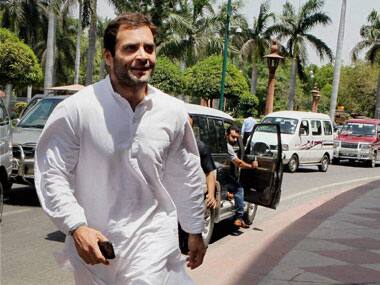Riding on a sympathy wave in the immediate aftermath of the assassination of Indira Gandhi, Rajiv Gandhi achieved an unprecedented feat, something that even his grandfather could not achieve, winning 4oo-plus seats Lok Sabha. The mandate was so overwhelming and one-sided that the second largest party was TDP, winning 30 seats, again on charisma and some sympathy factor for NT Rama Rao. The BJP was reduced to just two. That was the 8th Lok Sabha. Five years down the line, in 1989, the sympathy factor was no longer any use for Rajiv Gandhi and he was thrown out of the government on the basis of poor performance. The number of seats for the Congress slid from 404 to 197. [caption id=“attachment_119385” align=“alignleft” width=“380”]  Rahul Gandhi. PTI[/caption] VP Singh was the new flavour. Despite the brief and controversial regime of the National Front government led by VP Singh, the Congress still didn’t get a clear majority in 1991. It was during the course of electioneering that Rajiv Gandhi was assassinated in Sriperumbudur. There was a definite shift in polling pattern for the Congress in the elections that took place after his assassination. It was from this election that the BJP began its dramatic rise on the national scene – 85 in 1991, 120 in 1991, 187 in 1996. Sonia Gandhi’s evolution in Indian politics, since she agreed to become Congress president in 1998 and went on to win the elections for the Congress, has been based on same sympathy factor. The BJP was punished in 2004 for being unnecessarily harsh on Rajiv’s widow, who had made India her home. Congress vice president Rahul Gandhi is trying to evoke the same sympathy that worked for his father and mother. Rahul is thus technically the third generation Nehru-Gandhi family member to be trying to play that card. Whether it is Jaipur, Shahdol, Churu or Indore, Rahul has given a personal, emotive, tear-jerker touch to his speeches, talking about the assassination of his father and grandmother. He has narrated these tales with a purpose, linking the anger he felt since 31 October 1984 when his grandmother Indira was assassinated by Beant Singh and Satwant Singh, two guards, also friends of the young 14-year-old Rahul, to the BJP’s politics. He warned voters that the BJP was fanning communal riots all over the country and was responsible for the rise or terrorism, for recruitment of young angry Muslim boys by terror groups and Pakistan’s ISI. The onus was now on Rahul and Congress to douse that fire. He was thus channelizing the anger that he felt in his childhood against the killers of his grandmother to the BJP. The question is will it work the way it worked for his father and his mother, particularly when there is a huge popular disenchantment with the 10 years of the Congress-led UPA regime on issues of corruption and price rise? The fruits of the Congress’s recently delivered populists sops, food security and land Acquisition Act, have yet not reached the intended beneficiaries. The fact that Rajiv Gandhi couldn’t move people on grounds of sympathy twice and that he was thrown out of power in the very first election that he faced after being elected, is a clear indicator that it wouldn’t work for Rahul, no matter how hard he may try, to touch the emotive chord of the electorate. People of India had some sympathy and have duly reflected that in elections that followed since the time Sonia took charge of the Congress party. The wounds were then fresh, so Rajiv and Sonia evoked genuine empathy. Rahul on the other hand is already there. Despite his reluctance and failed charisma (as yet) as a leader, he is there as Congress vice president and his “nonsense” statement on the ordinance proved that he is more powerful than the collective might of the government and the party only because of his family lineage. He is there as leader of the party that rules India. Can he be both – the man who controls the government and the party yet pose as a rebellious outsider? Another important factor is that it has been 29 years since Indira Gandhi was assassinated. If 65 percent of India’s population is under 35, then at least 55 percent of Indian population and a substantial section of Indian electorate was born after 1984. Will his emotive narration connect with them? Economic issues concern Young India far more than an emotive chant for grandma or Papa. Just as the BJP’s constant reminder of dark Emergency days does not connect with people any longer or for that matter the way the Ram Mandir in Ayodhya is no longer an emotive issue the BJP can rely on, it is unlikely that evoking memories of Indira and Rajiv Gandhi’s assassination would work for Rahul. Rahul Gandhi has told us that he never liked studying. He preferred to look outside of his classroom at the petrol pump than listening to his school teacher’s geography lecture. That’s alright. No good politician, a few exceptions apart, have ever been good at studies. Rahul says he is into politics for the long haul, to give voice and ticket to the under privileged and thus looks beyond 2014 elections. His speeches are now longer than it used to be. But one wonders if emotive issues fill the content gap.
It’s 29 years since Indira was assassinated – at least 55 pc of Indians were born after 1984. Will Rahul’s emotive narration make a connect?
Advertisement
End of Article


)
)
)
)
)
)
)
)
)



